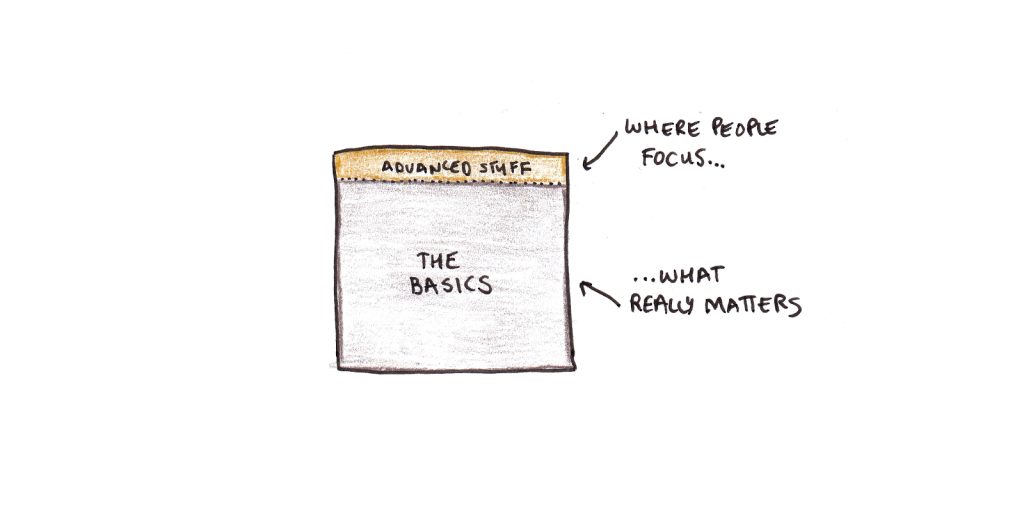Everyone wants advanced knowledge. But it’s typically the basics that matter most.
Most math is arithmetic, not algebra. Running a business is largely a matter of keeping revenues above costs. Good writing is the product of clear ideas and clean sentences.
I knew someone who was enrolled in a college Spanish class. The class was divided into sixteen weeks, one for each verb conjugation. Most of the time, the most common three or four conjugations are all you really need. What’s the point of studying the pluperfect subjunctive if you can’t speak in the present tense without hesitation?
All skills break down into elemental components–coding has commands, painting has brushstrokes, comedy has jokes. Mastery of the performance results from mastery of the parts.
Obvious, Yet Invisible
Ask yourself what you repeatedly do. What actions do you take every day in your job, your hobbies, your daily life?

We ignore the basics, not because they’re hidden, but because they’re so obvious. We don’t think about how to tie our shoes, drive a car, compose an email or complete routine tasks. Thoughtlessness saves effort but inhibits improvement.
Bringing attention back to the basics doesn’t come automatically. We adjust our habits only when they fail to deliver results.
One way to return to the basics is to change the environment. Skiing down a more difficult slope reveals technique errors not noticeable on groomed runs. Writing for an editor receives pushback you won’t get in your diary. Talking on the phone in a foreign language reveals mistakes you could avoid with body language in person.
Another strategy is to change your goals. When you set a different standard for what you want to produce, your actions must adapt.
Finally, you can find room for improvement by observing and analyzing your work after the fact. Re-read your old code. Videotape your Powerpoint presentations and watch them. Record yourself speaking French and listen to your pronunciation. Our minds operate with a tight mental bottleneck. We can’t simultaneously apply our full bandwidth to performing a skill and also monitor it for improvement. So separate these tasks–examine your mistakes when you’re not in the middle of making them.
What are the basics in your craft? What are you doing to master them?


 I'm a Wall Street Journal bestselling author, podcast host, computer programmer and an avid reader. Since 2006, I've published weekly essays on this website to help people like you learn and think better. My work has been featured in The New York Times, BBC, TEDx, Pocket, Business Insider and more. I don't promise I have all the answers, just a place to start.
I'm a Wall Street Journal bestselling author, podcast host, computer programmer and an avid reader. Since 2006, I've published weekly essays on this website to help people like you learn and think better. My work has been featured in The New York Times, BBC, TEDx, Pocket, Business Insider and more. I don't promise I have all the answers, just a place to start.